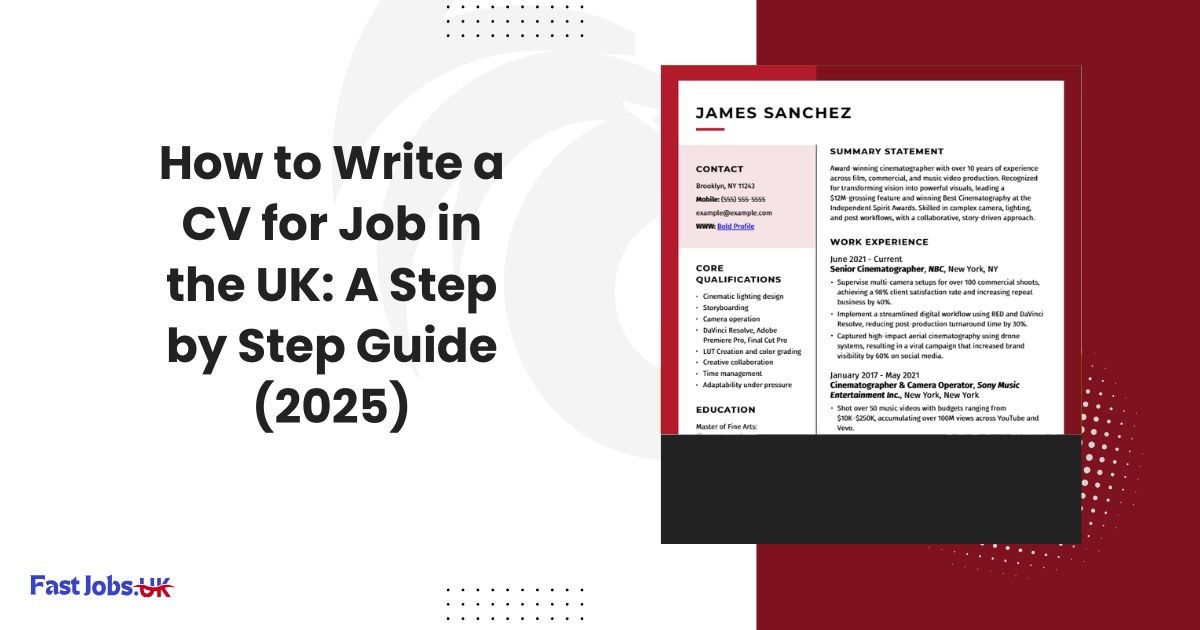How to Write a CV for Job in the UK: A Step by Step Guide (2025)

How to Write a CV for Job in the UK: Your CV is often the very first impression a potential employer has of you. In the competitive UK job market, a generic, poorly structured CV can get your application dismissed in seconds. But a sharp, professional, and well-tailored CV can open the door to your next great opportunity.
Many people are unsure of the specific conventions and expectations for a UK-style CV. This guide will walk you through, step-by-step, how to write a CV that gets noticed by recruiters and hiring managers.
Table of Contents
How to Write a CV for Job in the UK: First, What Makes a UK CV Different?
Before we start writing, it’s crucial to understand a few key rules that are specific to the UK job market:
- No Photos: It is standard practice not to include a photograph on your CV in the UK to avoid unconscious bias in the hiring process.
- No Personal Data: Do not include your date of birth, marital status, or nationality. This information is not relevant and is protected by UK employment law.
- Keep it to Two Pages (Max): A standard UK CV should be no longer than two sides of A4 paper. This shows you can be concise and prioritise information.
- Terminology: In the UK, the correct term is “CV” (Curriculum Vitae), not “résumé.”
The Key Sections of a Professional UK CV
Follow this structure to create a clean, professional, and easy-to-read document.
1. Contact Details
Place this at the top of the first page. Keep it clean and simple.
- What to include:
- Full Name (in a larger, bold font)
- Location (Your town/city and the first part of your postcode is enough, e.g., “Manchester, M4”)
- Phone Number
- Professional Email Address
- Link to your LinkedIn Profile (highly recommended)
2. Personal Statement (or Professional Summary)
This is a short, powerful paragraph (3-4 sentences) that summarises who you are, what you offer, and what you’re looking for.
- Formula: A [Your Profession] with [Number] years of experience in [Your Industry], skilled in [Skill 1], [Skill 2], and [Skill 3]. Seeking to leverage my expertise to [Your Goal] in a [Job Title] role.
Profile
An achievement-focused Warehouse Operative with over 4 years of experience driving efficiency and accuracy in fast-paced distribution centres. Proven ability to reduce picking times, improve stock accuracy, and train new staff to exceed team targets.
Work Experience
Warehouse Operative
Major UK Logistics, London | Jan 2023 – Present
- Reduced average order picking time by 15% after designing and implementing a new bin location system.
- Successfully onboarded and trained 3 new team members, leading to the team meeting its accuracy targets within their first month.
- Maintained a 99.8% order accuracy rate over a 12-month period, consistently exceeding the team target of 99.5%.
Stockroom Assistant
Retail Superstore, London | Sep 2021 – Dec 2022
- Decreased stock discrepancies by 25% within six months by introducing a diligent double-checking process for all incoming deliveries.
- Contributed to a full stockroom reorganisation project that improved access to top-selling items and reduced retrieval times by an estimated 10%.
References
Professional references available upon request.
3. Work Experience
Your work history is a key section of your CV. Begin with your current or most recent job and list previous roles in reverse order.
- Format: For each role, include your Job Title, the Company Name, the Location, and the Dates you worked there.
- Focus on Achievements, Not Just Duties: Instead of listing what you did, focus on what you achieved. Use bullet points and start each one with a strong action verb (e.g., “Managed,” “Increased,” “Developed,” “Reduced”).
- Quantify Your Success: Use numbers wherever possible. Instead of “Responsible for improving efficiency,” write, “Increased team efficiency by 15% by implementing a new scheduling system.”
4. Education
Like your work experience, list your education starting with the most recent qualification.
- Format: Include the University/College Name, your Degree (e.g., “BA (Hons) Business Management”), and the dates you attended.
- Pro-Tip: If you have limited work experience (e.g., you are a recent graduate), you should place this section above your Work Experience.
5. Skills
Create a dedicated section that allows a recruiter to see your key abilities at a glance. Grouping them into categories is a smart way to keep your CV organized and easy to read.
- Example Categories:
- Technical Skills: Microsoft Office Suite, Adobe Photoshop, Python, Project Management Software (Asana, Trello), etc.
- Soft Skills: Team Leadership, Communication, Problem-Solving, Customer Service.
- Languages: List any languages you speak and your proficiency level (e.g., “Spanish – Fluent”).
6. Hobbies and Interests (Optional)
This section is not essential, but it can be a nice touch to show some personality, especially if your interests are relevant to the job. Avoid generic hobbies like “socialising” or “watching movies.” Include interests that suggest positive traits, like “Team Captain for a local football club” (shows leadership) or “Running marathons” (shows dedication).
Also Check: The 10 Most Common Interview Questions in The UK (And How To Answer Them)
7. References
You do not need to list your referees’ contact details on your CV. The standard UK practice is to simply write:
- References available upon request.
Conclusion
A winning CV is your personal marketing document. By keeping it concise, tailoring it for each application, and focusing on your achievements, you create a powerful tool that will help you stand out from the crowd.
Now that your CV is ready to go, it’s time to find your next opportunity. Browse our Latest Jobs on Fastjobs.UK
Jessica, a Recruitment Content Specialist, crafts engaging job descriptions for Fastjobs.uk. Her ability to translate employer needs into captivating role narratives ensures that each listing attracts the right talent. When she's not creating compelling job content, she loves to travel and spend time with her standard poodle, Maximus.

